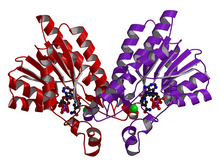L-xylulose reductase
Enzyme From Wikipedia, the free encyclopedia
Dicarbonyl/L-xylulose reductase, also known as carbonyl reductase II, is an enzyme that in human is encoded by the DCXR gene located on chromosome 17.
| L-xylulose reductase | |||||||||
|---|---|---|---|---|---|---|---|---|---|
 L-Xylulose reductase tetramer, Human | |||||||||
| Identifiers | |||||||||
| EC no. | 1.1.1.10 | ||||||||
| Databases | |||||||||
| IntEnz | IntEnz view | ||||||||
| BRENDA | BRENDA entry | ||||||||
| ExPASy | NiceZyme view | ||||||||
| KEGG | KEGG entry | ||||||||
| MetaCyc | metabolic pathway | ||||||||
| PRIAM | profile | ||||||||
| PDB structures | RCSB PDB PDBe PDBsum | ||||||||
| |||||||||
Structure
The DCXR gene encodes a membrane protein that is approximately 34 kDa in size and composed of 224 amino acids. The protein is highly expressed in the kidney and localizes to the cytoplasmic membrane.[1]
Function
DCSR catalyzes the reduction of several L-xylylose as well as a number of pentoses, tetroses, trioses, alpha-dicarbonyl compounds. The enzyme is involved in carbohydrate metabolism, glucose metabolism, the uronate cycle and may play a role in the water absorption and cellular osmoregulation in the proximal renal tubules by producing xylitol.[2]
In enzymology, an L-xylulose reductase (EC 1.1.1.10) is an enzyme that catalyzes the chemical reaction
- xylitol + NADP+ L-xylulose + NADPH + H+
Thus, the two substrates of this enzyme are xylitol and NADP+, whereas its 3 products are L-xylulose, NADPH, and H+.
This enzyme belongs to the superfamily of short-chain oxidoreductases, specifically those acting on the CH-OH group of donor with NAD+ or NADP+ as acceptor. The systematic name of this enzyme class is xylitol:NADP+ 2-oxidoreductase (L-xylulose-forming).
Clinical significance
A deficiency is responsible for pentosuria. The insufficiency of L-xylulose reductase activity causes an inborn error of metabolism disease characterized by excessive urinary excretion of L-xylulose.
Over-expression and ectopic expression of the protein may be associated with prostate adenocarcinoma.[3]
References
External links
Wikiwand - on
Seamless Wikipedia browsing. On steroids.




